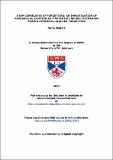Files in this item
ERP correlates of forgetting: an investigation of resource allocation as a potential neural mechanism behind retrieval-induced forgetting
Item metadata
| dc.contributor.advisor | MacLeod, Malcolm David | |
| dc.contributor.advisor | Jentzsch, Ines | |
| dc.contributor.author | Walters, Marie | |
| dc.coverage.spatial | 63 | en_US |
| dc.date.accessioned | 2012-10-22T14:05:15Z | |
| dc.date.available | 2012-10-22T14:05:15Z | |
| dc.date.issued | 2012-06-19 | |
| dc.identifier.uri | https://hdl.handle.net/10023/3209 | |
| dc.description.abstract | The present study was aimed at investigating a potential mechanism behind retrieval-induced forgetting that we have termed resource allocation. Three experiments were designed around the notion that increasing the number memories associated with one concept may reduce retrieval-induced forgetting by spreading out the limited resources available for that concept. In two experiments, we expanded the standard retrieval-induced forgetting (RIF) paradigm by increasing the number of items in each category and varying the amount of Rp+ and Rp- items. In one of these experiments, we recorded event-related potentials (ERPs) to examine the electrophysiological correlates of retrieval-induced forgetting. We then compared these findings to a standard version of the RIF paradigm as a control experiment. All three experiments produced significant facilitation effects, but failed to produce retrieval-induced forgetting. The absence of RIF in the present study, however, when combined with the imaging data allows us to discern the ERP correlates of selective retrieval from those of retrieval-induced forgetting. In the discussion, we present our case against conclusions drawn in other studies about the ERP correlates of RIF, and suggest that the characteristic frontoparietal components often found in RIF studies reflect the neural correlates of selective retrieval rather than inhibition. | en_US |
| dc.language.iso | en | en_US |
| dc.publisher | University of St Andrews | |
| dc.subject.lcc | BF378.F7W2 | en_US |
| dc.subject.lcsh | Recollection (Psychology) | en_US |
| dc.subject.lcsh | Evoked potentials (Electrophysiology) | en_US |
| dc.subject.lcsh | Memory--Physiological aspects | en_US |
| dc.title | ERP correlates of forgetting: an investigation of resource allocation as a potential neural mechanism behind retrieval-induced forgetting | en_US |
| dc.type | Thesis | en_US |
| dc.type.qualificationlevel | Doctoral | en_US |
| dc.type.qualificationname | MPhil Master of Philosophy | en_US |
| dc.publisher.institution | The University of St Andrews | en_US |
This item appears in the following Collection(s)
Items in the St Andrews Research Repository are protected by copyright, with all rights reserved, unless otherwise indicated.

